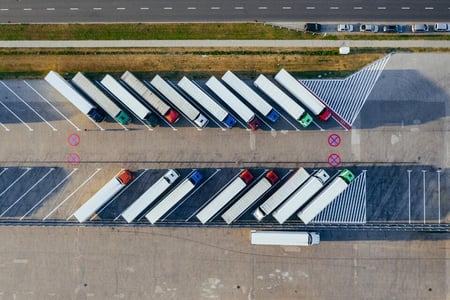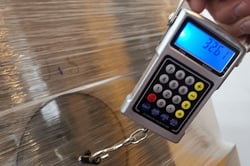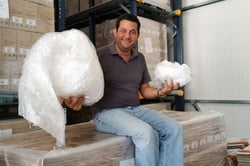We’re all aware that the Plastic Packaging Tax, or the Plastic Tax as it’s most commonly known, goes live from April 2022, but what does it mean for your business when it comes to making the right decisions for pallet wrap? We take a quick look at a couple of approaches you could consider.
But first, here’s an overview of the plastic tax...
What is the plastic packaging tax?
The plastic tax is a government tax levied on the production or import of plastic with less than 30% recycled content.
Products containing 30% or more recycled content will be exempt from the plastic tax in April 2022.
How much is the tax?
The tax is 20p per kilo (£200 per tonne).
Depending on the product you buy - pallet wrap, top sheets, tape, strapping – the cost increase will be different. Expect an approximate increase of 6-10% in the cost of the goods that do not have 30% or more recycled content.
How will it be charged?
The manufacturers and importers are charged directly by the government. Just like import duty and VAT.
You will notice an extra line on invoices for plastic packaging after April 2022 showing the total weight of (non-exempt) plastic. This will be charged at 20p per kilo.
Is transit packaging exempt?
Transit packaging on products you import is exempt. i.e Whatever is being used to contain the pallet whilst in transit and storage – eg. the plastic strapping, tape and pallet wrap on those goods - will not be subject to plastic taxes in the UK. However, if you are purchasing transit packaging from a manufacturer or importer you will be paying the plastic tax to that supplier.
What effect will the plastic packaging tax have?
At present the vast majority of the pallet wrap products purchased do not contain 30% recycled content, so they will be liable to tax.
To find out exactly how much this will affect you based on your current level of spend and products used, email us at plastictax@packaginginnovations.co.uk.
We will reply with a breakdown of the tax liability if the packaging product choice and usage remains unchanged. We’ll also make sure to include some tips on how we tackle this to minimise or even completely remove your exposure.
Some implications - 3 key points
1. Clearly, no plastic packaging tax needs to be paid for pallet wrapping when using plastic film with more than 30% recycled plastic content. BUT! Using recycled plastic pallet wrap isn’t necessarily the best way forward. Here’s why.
When comparing a stretch film pallet wrap of 30%+ recycled content to a stretch film of no recycled content, it’s likely that more plastic wrap will need to be used to achieve the same pallet stability outcomes. How can using more plastic [higher costs] be better for the planet or your profitability?
2. Something else to consider – Supply and demand
There isn’t enough recycled material available to support a mass shift to 30% recycled in the UK. If everyone switches suddenly to these products, the basic rules of supply and demand will kick in. Recycled raw material will increase in price and subsequently the 30% recycled products could actually become even more expensive.
3. So, all things considered, it may be the case that the best solution from a cost and an environmental perspective, is to pay the tax and use a film that wraps pallets with less plastic, to produce a lower cost per pallet.
What can be done to avoid any negative impacts?
Let’s consider a couple of different approaches...
Option 1 – reduce plastic
The most effective way to reduce exposure is to reduce plastic. This will have an immediate benefit of cost reduction as well as reducing exposure to the plastic packaging tax from April 2022.
This can be achieved by;
- using different plastic films - some are thinner and stronger
- using wrapping automation (Funding this with a price/pallet wrapped avoids the need to invest in machinery)
- learning more about adequate load stability
or a combination of all of these.
Option 2 – use a film that contains 30% recycled material.
 For some applications, using a stretch wrap film that contains 30% recycled material could have both a short-term and long-term benefit compared to the current films used.
For some applications, using a stretch wrap film that contains 30% recycled material could have both a short-term and long-term benefit compared to the current films used.
If you are already using plastic-reducing stretch wrap films like Fiber Film or Nano film, moving to a 30% recycled product will increase both plastic consumption and cost in the short term.
The solution in this situation will be to consider thinner and stronger films to further reduce cost.
Conclusion: making sense of the situation
Every pallet wrapping situation is different. There’s no fixed formula nor guidelines to best manage the plastic packaging tax. Simply using film with 30% or more recycled content to avoid paying the tax could result in a lose-lose situation - More plastic and higher costs!
Clearly, there are many influences that determine the impact of the plastic packaging tax on what defines the right solution for your pallet wrapping operation. A lot depends on the type of film currently being used as to the direction you take next.
Contact us today to find out how we can help you to produce a pallet wrap win for your profit and the planet.
About the author – Nathan Hutchinson
As founder and Managing Director of Packaging Innovations Limited, Nathan has been helping businesses in the UK to reduce plastic use in tertiary/transport packaging for more than a decade. Nathan and the team at Packaging Innovations take a holistic perspective on producing a win for customers’ profitability and a win for the planet when it comes to making the right decisions on pallet stretch wrap.
.jpg?width=960&length=960&name=PI%20Blog%20Image%20(13).jpg)





